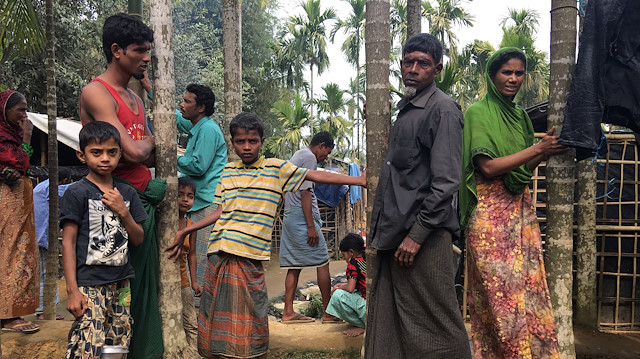
GETTING READY
But he added that the weather was a major problem, with efforts now underway to make the camps as secure as possible in case of a severe monsoon or cyclone season. Last year the Cox's Bazar area was not badly hit.
Anjum Nahed Chowdhury, a project manager with Christian Aid working on disaster risk reduction with BRAC, Bangladesh's largest NGO, is focused on strengthening bamboo for shelters, digging ditches, landslide protection, and building brick roads.
"We must be ready for the monsoon season and we are much better prepared this year. If the cyclones had been bad last year it would have been a disaster," she said.
While life in the camps is becoming normalised, the Rohingya are not allowed to formally work as this could impact local jobs, but they can earn about $5 a day on NGO projects in camps.
With this they can trade with each other at stalls that line the main roads winding through the camps that sell food, plastic toys and clothes as stray dogs and cows wander past.
Gemma Snowdon, a spokeswoman for the World Food Programme, said food in the camps was also changing to a longer-term plan.
At first they handed out rice, lentils and oil but now they are supplying people with cards with monthly amounts based on family size with which they can buy fresh food, dried fish and eggs from stores set up by local retailers in the camps.
Another programme, run by the U.N.'s Food and Agricultural Organization (FAO), International Organization for Migrants (IOM) and WFP, is supplying all households with stoves and a monthly canister of LPG to reduce pollution and deforestation.
The loss of forest has been a key source of tension with some local people, who are now outnumbered two to one by the Rohingya, and lost some traditional income from the forest.
While other locals, like Theotonius Gomes who runs the Mag Darin restaurant, have welcomed the influx of aid workers which has boosted businesses and prompted the government to start work on an international airport terminal and extended runway.
But all the aid work comes at a cost.
Last year U.N. agencies and NGOs launched a $950.8 million appeal to provide essential humanitarian assistance, including to nearly 400,000 Bangladeshis in nearby communities, some of whom are as poor as the Rohingya, in a bid to diffuse tensions.
A new funding plan will be launched later this month, with initial drafts of the proposal, seen by the Thomson Reuters Foundation, showing the target will be about $920 million.
Aid groups are well aware raising funds could get harder as the crisis rolls on and new emergencies hit the headlines.
"But this emergency is not over yet. Still the Rohingyas need our help and support," said Al-Khateeb.














